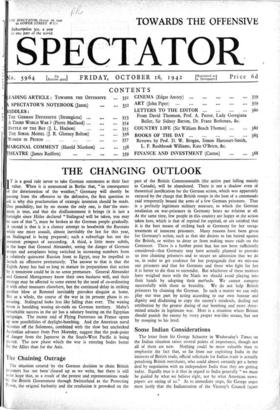THE CHANGING OUTLOOK
T is a good rule never to take German statements at their face value. When it is announced in Berlin that, "in consequence of the deterioration of the weather," Germany will shortly be passing from the offensive to the defensive, the first question to ask is why this proclamation of strategic intention should be made. One possibility, but by no means the only one, is that' the state- ment is true, and that the disillusionment it brings (it is just a fortnight since Hitler declared "Stalingrad will be taken, you may be sure of that "), must be broken to the German people gradually. A second is that it is a clumsy attempt to hoodwink the Russians while one more assault, almost inevitably the last for this year, on Stalingrad is being prepared; such a subterfuge has not the remotest prospect of succeeding. A third, a little more subtle, is the hope that General Alexander, seeing the danger of German troops and aeroplanes being switched in increasing numbers from a relatively quiescent Russian front to Egypt, may be impelled to launch an offensive prematurely. The answer to that is that the Eighth Army has had so long to mature its preparations that action by it tomorrow could be in no sense premature. General Alexander and General Montgomery know their own business well, and their strategy may be affected to some extent by the need of co-ordinating it with other measures elsewhere, but the continued delay in striking another blow at Rommel inevitably provokes disquiet at home. But as a whole, the course of the war in its present phase is re- assuring. Stalingrad looks less like falling than ever. The waxing moon is heralding waxing air-raids on German territory. Malta's remarkable success in the air has a salutary bearing on the Egyptian campaign. The recent raid of Flying Fortresses on France opens up new possibilities of daylight-bombing. And the American naval victories off the Solomons, combined with the slow but unchecked Australian advance from Port Moresby, suggest that the peak-point of danger from the Japanese in the South-West Pacific is being passed. The new phase which the war is entering bodes better for the Allies than for the Axis.


























